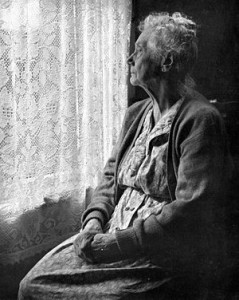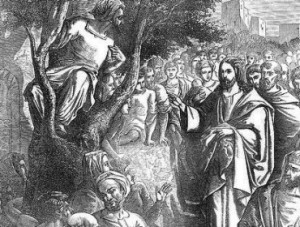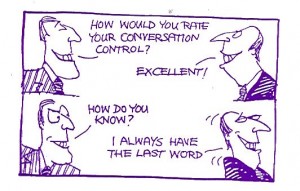====================
This sermon was preached on Sunday, December 16, 2012, at St. Paul’s Episcopal Church, Medina, Ohio, where Fr. Funston is rector.
(Revised Common Lectionary, Advent 3, Year C: Zephaniah 3:14-20; Canticle 9 (The First Song of Isaiah, Ecce Deus, Isaiah 12:2-6); Philippians 4:4-7; and Luke 3:7-18. These lessons can be read at The Lectionary Page.)
====================
 Did you pay attention to the words of the song we just sang as our sequence hymn? Listen to them again:
Did you pay attention to the words of the song we just sang as our sequence hymn? Listen to them again:
Comfort, comfort ye my people,
Speak ye peace, thus saith our God;
Comfort those who sit in darkness,
Mourning ‘neath their sorrows’ load . . . .
(Hymn 67, The Hymnal 1982)
These are God’s words to the prophet Isaiah; we find them in the 40th chapter of Isaiah. They are God’s instructions to Isaiah, but I think every priest hears them personally when we are called on to minister to someone in times of trouble and loss. “Comfort, comfort my people; comfort those who are in sorrow.”
Since Friday morning when I, like many others, sat in stunned silence struggling to understand the horror of what had just happened at Sandy Hook Elementary School in Newtown, Connecticut, I have had a recurring vision of Christmas presents under Christmas trees in darkened homes, presents that will never be unwrapped. I see mothers and fathers sitting in that darkness mourning beneath a load of sorrow I don’t think I could ever comprehend, and I wonder if I as a priest or as a friend could speak any word of comfort to them. I have known the pain and brokenness of losing loved ones; I have known the sadness that comes with the death of parents and siblings. But I can only imagine (and I’m sure completely inadequately) the grief and agony a parent must feel when his or her child has been murdered; I can only imagine how broken those parents’ hearts must be, how broken they must feel. I don’t know if I could offer any comfort to them.
I have spent the past 48 hours following the news reports, weeping, screaming at the television, reading the statements of bishops and other clergy, enraged at the injustice of it, angry because as a society we seem unwilling (not incapable, unwilling) to do anything about the epidemic of gun violence that seems to sweep unchecked across our country.
This is not the way we are supposed to be on this, the Third, Sunday of Advent! In the tradition of the church, today is known as Gaudete Sunday or “Rejoicing Sunday” because in the medieval church the introit, the first words of the Mass, was Gaudete in Domino semper: iterum dico, gaudete, the first words of our epistle lesson this morning: “Rejoice in the Lord always; again, I say, rejoice.” The same theme is struck in the Old Testament reading from the Prophet Zephaniah and in the Gradual taken from the Prophet Isaiah; these readings are meant to emphasize our joyous anticipation of the Lord’s coming. “Rejoice and exult with all your heart,” Zephaniah cries out, but when our hearts are broken how are we to do that? Here in the depths of dealing with a senseless act of brutality, there is damned little rejoicing in our broken hearts, there is damned little comfort. We are in the midst of a murderous gun violence epidemic and I find it hard to rejoice.
Consider what has gone on in just the past week: last Sunday a man fatally shot his security-officer wife, tried to kill another person, and then killed himself in an employee parking lot at Cleveland-Hopkins Airport; on Tuesday a masked gunman killed two people and seriously injured another in a Portland, Oregon, shopping mall; on Friday, the Sandy Hook Elementary School killings, the second worst mass shooting at a school in U.S. history; and yesterday, a gunman shot three people in a hospital in Birmingham, Alabama. Earlier this year we saw fatal mass shootings in Minneapolis, in Tulsa, in a Sikh temple in Wisconsin, in a theater in Colorado, in a coffee bar in Seattle, and in a college in California. It is painfully clear that this is an epidemic of violence, that all is not well in our country. Like our hearts, our society is broken.
According to the Centers for Disease Control, there are about 31,000 deaths from firearms annually in our country. Of those, 500 are accidental; another 300 or so are considered “legal” as the result of law enforcement actions; and the nature of about 200 cannot be determined. That means that about 30,000 intentional, illegal, fatal shootings occur in the United States in a year’s time; 62% of those are suicides; 38% are murders.
Speak ye to Jerusalem
of the peace that waits for them;
tell her that her sins I cover,
and her warfare now is over.
As someone who, everyday, tries to speak the word of God to people who need to hear it, I don’t know that I can do that! I don’t know if I could comfort those parents mourning beneath their dark load of sorrow, and I don’t know how I could tell you that our warfare, our plague of gun violence is over! Our warfare is not over; the slaughter goes on . . . one or two people here, thirteen theater-goers there, twenty children in Connecticut . . . the massacre continues more than 11,000 times a year. Yes, it is painfully clear that this is an epidemic of violence, that all is not well in our country. Like our hearts, our society is broken.
John the Baptizer warned the people who came to him that all was not well in their society, that it was broken. “Do not,” he told them, “begin to say to yourselves, ‘We have Abraham as our ancestor.'” Don’t think that because you are who you are that all is well and that all will be well; it is not and it will not be. Our society is broken! “And the crowds asked him, ‘What then should we do?'” John’s answer was simplicity itself – do what you know to be right. If you have two coats, if you have extra food, and your neighbor has none, share. If you have taken on the job of tax collector, or if you are a soldier entitled to ask citizens for support, collect no more than you should, ask no more than is proper. Just do what you know to be right, do what you know ought to be done.
Every time one of these mass shootings occurs there is an outpouring of public grief, and there are expressions of sorrow and sympathy. Every time this has happened, however, we have been told that it is not the appropriate time to talk about strengthening our nation’s gun control laws; we are told that it is too soon to talk about doing something about gun violence; we are told that we have to give the families of the victims time to heal. But as John the Baptizer said to those who came to him at the Jordan, the time is now – “Even now,” he said, “the ax is lying at the root of the trees . . . .” There is no time like the present to do what we know to be right, to do what we know ought to be done.
I believe that that talk about time to heal is a sham. I don’t think anyone ever “heals” from the death of a loved one; one remains broken. I know that I have never “healed” from the deaths of my parents or of my brother or of any other person I loved; forever, after each death, there is a part of me that is and will always be broken. As a parent, I am very sure I would never “heal” from the murder of my child; I would be forever broken. But I know that life goes on and, through the grace of God, we are given the strength to live it, even as wounded, as broken, as broken-hearted as we may be. As Isaiah said, “Surely, it is God who saves me; I will trust in him and not be afraid. For the Lord is my stronghold and my sure defense, and he will be my Savior.” The one who was broken on Calvary’s tree was broken that I, in my brokenness, might be made whole. Through his brokenness, in our brokenness, we are given the peace of God which passes all understanding.
Life goes on, and by the grace of our Savior we are given the strength to live it, and in it to do what we know to be right, to do what we know ought to be done. The only question is whether we have the will to do it.
Make ye straight what long was crooked,
make the rougher places plain;
let your hearts be true and humble,
as befits his holy reign.
Have we the will to do what we know to be right, to make what is crooked straight, to make what is rough plain? Are our hearts, broken though they may be, true and humble as befits our Savior’s holy reign?
Many of you know that I’m a great fan of the singer-songwriter Leonard Cohen and many of you are familiar with his song Hallelujah. In it there is this great line:
Love is not a victory march
It’s a cold and it’s a broken Hallelujah
And again, later in the song, the singer says of love,
It’s not a cry you can hear at night
It’s not somebody who has seen the light
It’s a cold and it’s a broken Hallelujah
In the funeral liturgy of our church, near the end of the service, the priest stands at the body of the deceased and says, “All of us go down to the dust; yet even at the grave we make our song: Alleluia, alleluia, alleluia.” When each of those twenty children, each of those seven adults are buried, their families will hear those as cold and broken Hallelujahs! But as our Advent hymn reminds us in its conclusion,
For the glory of the Lord
now o’er the earth is shed abroad,
and all flesh shall see the token
that the word is never broken.
Our hearts may be broken; our lives may be broken; our society may be broken, but God’s word, God’s promise is never broken. The Word made flesh, Jesus Christ, he was broken . . . broken on the Cross that we might be made whole. Risen unbroken though still bearing the scars of our brokenness, he will return again so that we might sing not a broken, but a whole Hallelujah, a holy Hallelujah, so that we might “rejoice in the Lord always.”
I still don’t know if I could comfort those grieving parents, but I do know that I believe in God, that I believe God’s promise, and that I believe in Jesus Christ, the One who was broken that we might be made whole. It is his birth and its promise of wholeness that we prepare to celebrate in this Advent season. And because I believe, I know that I could, at least, be with those families in this time of grief, that I could sit with them, and that I could assure them in words just slightly changed from the end of Mr. Cohen’s song . . . .
There’s a blaze of light in every word
It doesn’t matter which you heard
The holy or the broken Hallelujah.
* * * *
And even though it all went wrong
We’ll stand before the Lord in song
With nothing on our tongue but Hallelujah!
 As I read the lesson from Exodus today, there is a bush in my dining room. It’s a four-foot tall evergreen and it’s sort of burning. There are little electrical lights all ablaze all over it. It’s our Christmas tree. (We have a short Christmas tree set on a table because we have three cats. We tried for a couple of years to have a normal size seven-foot tree with these guys, but it was impossible. So, small tree on table.)
As I read the lesson from Exodus today, there is a bush in my dining room. It’s a four-foot tall evergreen and it’s sort of burning. There are little electrical lights all ablaze all over it. It’s our Christmas tree. (We have a short Christmas tree set on a table because we have three cats. We tried for a couple of years to have a normal size seven-foot tree with these guys, but it was impossible. So, small tree on table.) The first word of this bit of Isaiah in Hebrew is often translated “Woe” but here in the New Revised Standard Version, it has been rendered “Ah”. The Hebrew is hôy ; it is a negative exclamation pronounced “oy!” Perhaps the “woe” translation is better. However, the construction “woe to you . . . . ” has taken on an oracular connotation to modern ears and that is not what the prophet is saying here. He will later make prediction about these oppressors, but for now he is simply making an indictment.
The first word of this bit of Isaiah in Hebrew is often translated “Woe” but here in the New Revised Standard Version, it has been rendered “Ah”. The Hebrew is hôy ; it is a negative exclamation pronounced “oy!” Perhaps the “woe” translation is better. However, the construction “woe to you . . . . ” has taken on an oracular connotation to modern ears and that is not what the prophet is saying here. He will later make prediction about these oppressors, but for now he is simply making an indictment.  Did you pay attention to the words of the song we just sang as our sequence hymn? Listen to them again:
Did you pay attention to the words of the song we just sang as our sequence hymn? Listen to them again: This is the part of the Maundy Thursday – Good Friday story that breaks my heart! I so identify with Peter; he’s such a bumbling fool on so many occasions and Jesus just keeps on holding him close, knowing that eventually he will pull through. I know that I would have done no better than Peter in those dark hours of Thursday night. I might not even have done as well as he did; I’m not sure I’d have had the courage to follow Jesus into the high priest’s courtyard!
This is the part of the Maundy Thursday – Good Friday story that breaks my heart! I so identify with Peter; he’s such a bumbling fool on so many occasions and Jesus just keeps on holding him close, knowing that eventually he will pull through. I know that I would have done no better than Peter in those dark hours of Thursday night. I might not even have done as well as he did; I’m not sure I’d have had the courage to follow Jesus into the high priest’s courtyard!
 “When those blue snowflakes start falling, that’s when those blue memories start calling,” runs a line from Elvis Presley’s Blue Christmas. While most of us are getting ready for happy family reunions during the holidays, and clergy and liturgical ministers of all sorts are preparing for one of the year’s biggest crowds, we may forget that Christmas can be a time of great sadness for many. Mental health professionals note that the Christmas season may be one when many people avoid church. Millions of Americans suffer from the “holiday blues.” I know this all too well because December 21st is the anniversary of my mother’s death.
“When those blue snowflakes start falling, that’s when those blue memories start calling,” runs a line from Elvis Presley’s Blue Christmas. While most of us are getting ready for happy family reunions during the holidays, and clergy and liturgical ministers of all sorts are preparing for one of the year’s biggest crowds, we may forget that Christmas can be a time of great sadness for many. Mental health professionals note that the Christmas season may be one when many people avoid church. Millions of Americans suffer from the “holiday blues.” I know this all too well because December 21st is the anniversary of my mother’s death. Zacchaeus climbs a tree to see Jesus. So today’s reading got me thinking scattered thoughts about trees. The weeping willow in my childhood backyard. The peach and cherry trees in my grandfather’s garden. The pinion pines of my native Nevada. The eucalyptus trees that were everywhere on my college campus. The huge ornamental pepper tree that shaded the first house my wife and I bought. I close my eyes, think of those trees, and I see my parents, my childhood friends, my college roommates. Trees are filled with meaning and memory; they bear the fruits of remembrance.
Zacchaeus climbs a tree to see Jesus. So today’s reading got me thinking scattered thoughts about trees. The weeping willow in my childhood backyard. The peach and cherry trees in my grandfather’s garden. The pinion pines of my native Nevada. The eucalyptus trees that were everywhere on my college campus. The huge ornamental pepper tree that shaded the first house my wife and I bought. I close my eyes, think of those trees, and I see my parents, my childhood friends, my college roommates. Trees are filled with meaning and memory; they bear the fruits of remembrance. It may be the United States’ holiday of Thanksgiving Day, but the Daily Office continues at this time of year delivering its message of repentance rather than encouraging thanksgiving. The Old Testament lesson is another from Malachi in which the Lord speaking to the priests says that he has spread dung on their faces and put them out of his presence! The gospel lesson from Luke has Jesus predicting the end of the world. And then there’s this epistle lesson which condemns the wealthy. Just not a lot of giving thanks!
It may be the United States’ holiday of Thanksgiving Day, but the Daily Office continues at this time of year delivering its message of repentance rather than encouraging thanksgiving. The Old Testament lesson is another from Malachi in which the Lord speaking to the priests says that he has spread dung on their faces and put them out of his presence! The gospel lesson from Luke has Jesus predicting the end of the world. And then there’s this epistle lesson which condemns the wealthy. Just not a lot of giving thanks! It shouldn’t, but it always surprises me when I preside at a worship service and the offering of alms (cash money) is small. This is especially so at a small-attendance service when there are only a few people but even fewer dollars in the plate. It surprises me, I suppose, because of something I was taught by my grandfather. It shouldn’t surprise me, I suppose, because of the realities of which I am aware.
It shouldn’t, but it always surprises me when I preside at a worship service and the offering of alms (cash money) is small. This is especially so at a small-attendance service when there are only a few people but even fewer dollars in the plate. It surprises me, I suppose, because of something I was taught by my grandfather. It shouldn’t surprise me, I suppose, because of the realities of which I am aware. Jesus son of Sirach offered a lot of good advice in his little book sometimes called Liber Eccesiasticus, a book not included in the canon of inspired Scripture recognized by Protestants, but found in that selection of texts called the Apocrypha. Anglicans decline to use these texts to settle matters of doctrine, but read them ” for example of life and instruction of manners.” (Articles of Religion, Article VI, BCP 1979, page 868)
Jesus son of Sirach offered a lot of good advice in his little book sometimes called Liber Eccesiasticus, a book not included in the canon of inspired Scripture recognized by Protestants, but found in that selection of texts called the Apocrypha. Anglicans decline to use these texts to settle matters of doctrine, but read them ” for example of life and instruction of manners.” (Articles of Religion, Article VI, BCP 1979, page 868)

